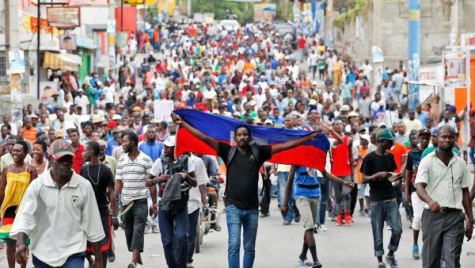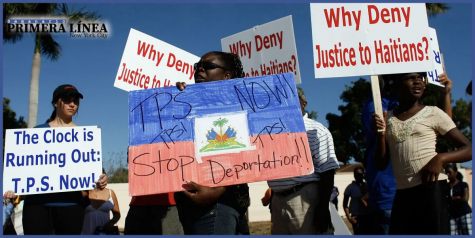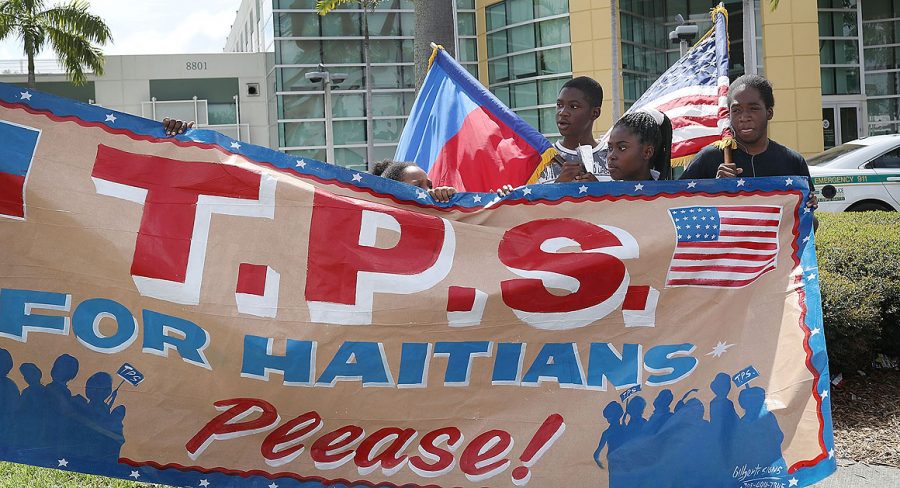The Fight for TPS for Haitian People
MIAMI, FL – MAY 13: People protest the possibility that the Trump administration may overturn the Temporary Protected Status for Haitians in front of the U.S. Citizenship and Immigration Services office on May 13, 2017 in Miami, Florida. 50,000 Haitians have been eligible for TPS and now the Trump administration has until May 23 to make a decision on extending TPS for Haitians or allowing it to expire on July 22 which would mean possibly deportation for the current TPS holders. (Photo by Joe Raedle/Getty Images)
October 28, 2021
During conversations surrounding immigration in the United States, a lot of times, Black immigrants are left out. Their difficult endurance caused by their intersectionality are heavily excluded from many of the fights of protection for immigrants that we see today. This can especially be seen this year, with Haitian refugees and migrants at the U.S. border due to political instability after the assassination of Haitian president, Jovenel Moise. The history of causes for Haitian migration did not begin in 2021, as the earthquake in 2010 left thousands of Haitian people dead. Poverty, violence, and corruption have long spurred Haitian migration as well.

Many Haitian people have referred to Jovenel’s presidency as the root for many of the country’s problems, as he was elected in 2017 and refused to step down from the position, claiming that his term did not yet end. Along with this, he denied accusations of his presidency being a dictatorship. Protests against his presidency began throughout cities back in 2018, first in response to increased fuel prices and the removal of subsidies, then later for the resignation of Moise. Protesters have been met with abuse by law enforcement, causing fear for simple tasks such as leaving one’s home, buying groceries, or paying for a bus. Violence as a whole became and continues to be a threat to Haitian people, as schools began to close its doors in fear of kidnapping. It’s constitutional crisis has only worsened its current state.

Following it’s devastating earthquake in 2010, and then another in 2021, thousands of lives have been lost, as well as homes, leaving many Haitian people homeless and seeking asylum. In 2010, many Haitians searched for asylum in South America, such as Brazil who offered job opportunity. With the COVID-19 pandemic, employment became much more scarce, and has caused countries in the region to close their borders. An example of this is Chile, where many Haitian migrants move to, but has enacted a new immigration law said to reduce immigration, especially from places such as Haiti and Venezuela. This has left them with the only option to move northward.
Today, and for years prior, activists as well as Haitian people have been asking for TPS (Temporary Protected Status) for Haitian migrants, especially after U.S. Border Patrol agents expelled about thirty thousand migrants, the majority of them Haitian people sheltering near Del Rio, Texas. The Donald Trump government began utilizing Title 42, a public health order that allows for the rapid deportation of migrants in March 2020 following the 2019 pandemic. Since then, Customs and Border Protection has deported the majority of migrants kept at the border without first evaluating their asylum claims, as is required by law in the United States. Title 42, which restricts where and how refugees can petition for asylum, has been upheld by the Biden administration. This has made it difficult for Haitian people to receive help during this crisis, emphasizing the importance of supporting Haitian people who have yet to receive protection from deportation.

If you would like to support Haitian refugees:
Still Stateless (Donations): https://gofund.me/347b66c0
Take Action (Petitions & Donations): https://nnirr.org/take-action-sign-the-petition-to-halt-all-deportations-of-haitians-at-the-border-and-allow-asylum-for-haitian-refugees/
TPS For Haiti (Petition): https://act.colorofchange.org/sign/Redesginate_TPS_Haiti/
More Info: https://www.hrw.org/news/2021/09/21/us-treatment-haitian-migrants-discriminatory#
Sources:
-Isaac, Harold, et al. “Haiti Braces for Unrest as a Defiant President Refuses to Step Down.” The New York Times, The New York Times, 7 Feb. 2021, https://www.nytimes.com/2021/02/07/world/americas/haiti-protests-President-Jovenel-Mois.html.
-Reveco, Cristián Doña. “Chile’s Retooled Migration Law Offers More Restrictions, Less Welcome.” Migration Policy Institute, May 2021, https://www.migrationportal.org/insight/chiles-retooled-migration-law-offers-more-restrictions-less-welcome/.
-Alden, Edward. “Why Are Haitian Migrants Gathering at the U.S. Border?” Council on Foreign Relations, Council on Foreign Relations, 1 Oct. 2021, https://www.cfr.org/in-brief/why-are-haitian-migrants-gathering-us-border.



